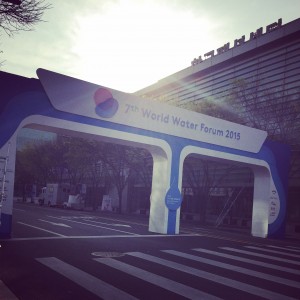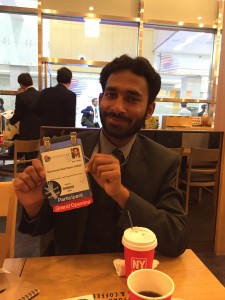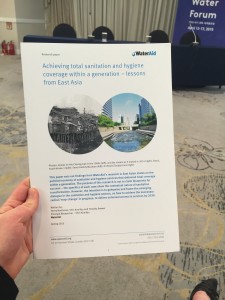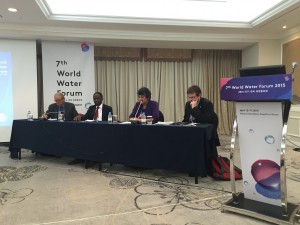Event Summary: Daegu Day 4 – From vision to action for universal hygiene
April 16, 2015
This blog is the fourth in a series of daily updates on handwashing at the World Water Forum 7 happening this week in South Korea. Our PPPHW Deputy Secretariat Director, Hanna Woodburn reports from Daegu. 
After arriving at EXCO early on Thursday morning, I chatted with a few other conference attendees who all said the same thing: “I’m tired!” I am afraid I have to echo that sentiment. The week has been busy, productive, and challenging. I’ve attended sessions, asked questions, passed out stickers, and Tweeted. Above all, I have asked others to ensure that the “H” in WASH not be silent, but rather be articulated loud and clear.
Despite the lagging energy level amongst many at this stage in the week, I had a meeting with young WASH advocates who more than made up for any lethargy. They spoke passionately about the need for hygiene improvement in their countries and shared their energy and excitement about leveraging existing youth networks to promote behavior change. Our meeting was nothing less than inspiring. One of these advocates, Muhammad, reminded me that poor hygiene where he works in rural Pakistan is a result of limited knowledge around key behaviors, such as food hygiene. The community also lacks social norms around handwashing and often resources. The bitter irony is that these are the families who would most benefit from good handwashing practices to protect themselves from preventable illnesses such as diarrhea and pneumonia, which can far too easily set a poor family back significantly.
In a way, this meeting was a nice bookend to the week. I’ve spent so much time engaging in heady conversations around indicators, financing, and ensuring good enabling environments that it was nice to be brought back to the basics. It brought practical focus to the next session I attended, hosted by WaterAid, which examined how countries in East Asia, such as Korea and Malaysia, achieved universal sanitation and hygiene.
One factor they found in the success of these programs was synergies at the intersection of high-level support and local activation. If we hope to accelerate progress on WASH we must ensure that the enabling environment fosters good WASH policies and practices. There must be funding, policies, and political will to support access. However, local communities must also be invested – particularly when it comes to sanitation and hygiene, which both require behavior change rather than simple service provision. Local solutions are essential to success in this context. This dual top-down/bottom-up approach is very instructive, particularly as we look forward to the agreement of the Sustainable Development Goals (SDGs). The SDGs will be an important catalyst, but they alone will not be sufficient to address the entrenched challenges the sector faces.
For the children who live in the region where Muhammad works, and millions of others around the world, water, sanitation and hygiene are what stands between health and illness, between life and death. And yet, for far too many of these children, WASH remains a luxury. It is incumbent upon us all to work together to right this wrong. Ultimately, I am leaving Korea cautiously optimistic. The right conversations are happening. The big challenge is turning these into the right action. There is a passionate future generation of WASH leaders ready to make change happen, and while we may not yet agree on indicators, we all recognize the importance the SDGs will have on the sector.
I believe important steps were taken at the 7th World Water Forum this week to move universal access to water, sanitation, and hygiene from vision to reality. The PPPHW looks forward to continuing to help achieve that reality. I encourage you all to raise a hand for handwashing.



